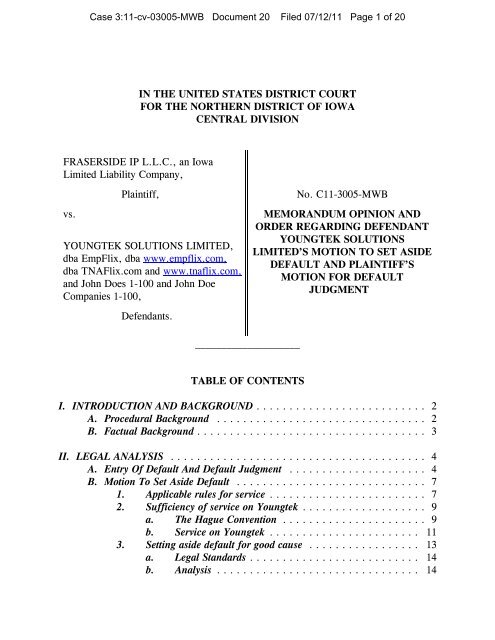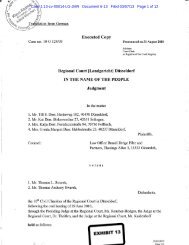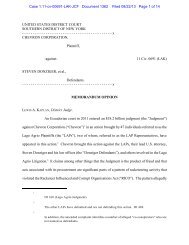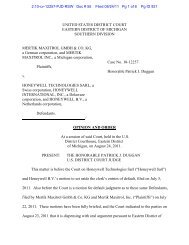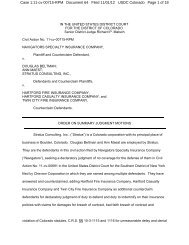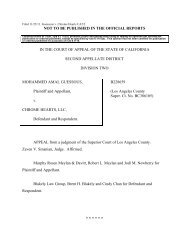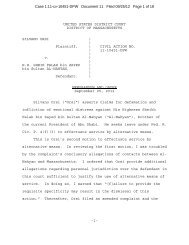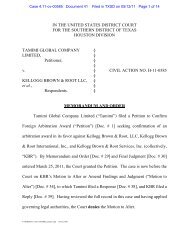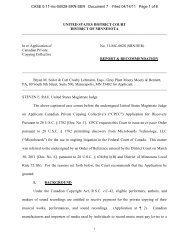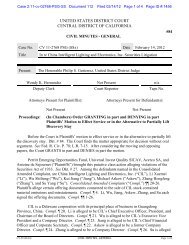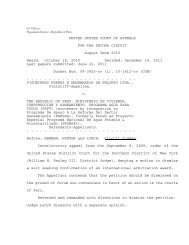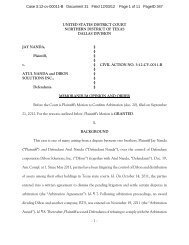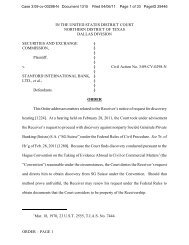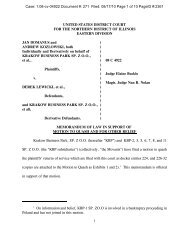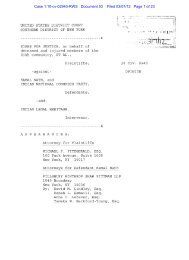G:\BobX3\2011-12\Fraserside. set aside deafult ... - Letters Blogatory
G:\BobX3\2011-12\Fraserside. set aside deafult ... - Letters Blogatory
G:\BobX3\2011-12\Fraserside. set aside deafult ... - Letters Blogatory
Create successful ePaper yourself
Turn your PDF publications into a flip-book with our unique Google optimized e-Paper software.
Case 3:11-cv-03005-MWB Document 20 Filed 07/12/11 Page 1 of 20<br />
IN THE UNITED STATES DISTRICT COURT<br />
FOR THE NORTHERN DISTRICT OF IOWA<br />
CENTRAL DIVISION<br />
FRASERSIDE IP L.L.C., an Iowa<br />
Limited Liability Company,<br />
Plaintiff, No. C11-3005-MWB<br />
vs. MEMORANDUM OPINION AND<br />
ORDER REGARDING DEFENDANT<br />
YOUNGTEK SOLUTIONS LIMITED,<br />
dba EmpFlix, dba www.empflix.com,<br />
dba TNAFlix.com and www.tnaflix.com,<br />
and John Does 1-100 and John Doe<br />
Companies 1-100,<br />
Defendants.<br />
____________________<br />
TABLE OF CONTENTS<br />
YOUNGTEK SOLUTIONS<br />
LIMITED’S MOTION TO SET ASIDE<br />
DEFAULT AND PLAINTIFF’S<br />
MOTION FOR DEFAULT<br />
JUDGMENT<br />
I. INTRODUCTION AND BACKGROUND .......................... 2<br />
A. Procedural Background ................................ 2<br />
B. Factual Background ................................... 3<br />
II. LEGAL ANALYSIS ....................................... 4<br />
A. Entry Of Default And Default Judgment ..................... 4<br />
B. Motion To Set Aside Default ............................. 7<br />
1. Applicable rules for service ........................ 7<br />
2. Sufficiency of service on Youngtek ................... 9<br />
a. The Hague Convention ...................... 9<br />
b. Service on Youngtek ....................... 11<br />
3. Setting <strong>aside</strong> default for good cause ................. 13<br />
a. Legal Standards .......................... 14<br />
b. Analysis ............................... 14
Case 3:11-cv-03005-MWB Document 20 Filed 07/12/11 Page 2 of 20<br />
i. Blameworthiness or culpability ........... 14<br />
ii. Youngtek’s possible defenses ............. 17<br />
iii. Whether Fraserside would be prejudiced ..... 19<br />
iv. Summary .......................... 20<br />
C. Motion For Default Judgment ........................... 20<br />
III. CONCLUSION ........................................ 20<br />
In this lawsuit, the plaintiff asserts a variety of copyright and trademark<br />
infringement claims against defendants concerning adult motion pictures on their internet<br />
websites. The Clerk of Court has entered a default against defendant Youngtek Solutions<br />
Limited (“Youngtek”). Youngtek, a foreign corporation, has moved to <strong>set</strong> <strong>aside</strong> that<br />
default on the grounds that it is void for insufficient service of process and, alternatively,<br />
that it should be <strong>set</strong> <strong>aside</strong> for good cause. The plaintiff has resisted Youngtek’s motion on<br />
all grounds, asserting that the default should be allowed to stand, and filed its own motion<br />
for default judgment in which it requests that default judgment be entered in its favor.<br />
I. INTRODUCTION AND BACKGROUND<br />
A. Procedural Background<br />
On February 17, 2011, plaintiff Fraserside IP L.L.C. (“Fraserside”) filed a<br />
complaint against Youngtek, John Does, and John Doe Companies, alleging the following<br />
causes of action: copyright infringement, in violation of 17 U.S.C. §§ 106 and 501 et seq.;<br />
contributory copyright infringement, in violation of 17 U.S.C. §§ 106 and 501 et seq.;<br />
2
Case 3:11-cv-03005-MWB Document 20 Filed 07/12/11 Page 3 of 20<br />
vicarious copyright infringement, in violation of 17 U.S.C. §§ 106 and 501 et seq.;<br />
inducing copyright infringement, in violation of 17 U.S.C. §§ 106 and 501 et seq.;<br />
trademark infringement, in violation of 15 U.S.C. § 1114; contributory trademark<br />
infringement, in violation of 15 U.S.C. § 1114; vicarious trademark infringement, in<br />
violation of 15 U.S.C. § 1114; false designation of origin, in violation of 15 U.S.C.<br />
§ 1125(a); and, dilution of trademark, in violation of 15 U.S.C. § 1125(c). On April 13,<br />
2011, Fraserside had a private process server, Tassos Kontos, serve copies of a summons<br />
and complaint upon Youngtek’s registered agent for service of process in Cyprus.<br />
On June 1, 2011, Fraserside filed a Motion for Clerks Entry of Default (docket no.<br />
11). On June 2, 2011, the Clerk of Court entered Youngtek’s default (docket no. 13). On<br />
June 16, 2011, Fraserside filed a Motion For Entry Of Default Judgment (docket no. 14).<br />
On June 17, 2011, Youngtek filed a Motion To Set Aside Default (docket no. 15). In its<br />
motion, Youngtek moves to <strong>set</strong> <strong>aside</strong> the default arguing it has not been properly served.<br />
Youngtek argues, alternatively, that the default should be <strong>set</strong> <strong>aside</strong> for good cause. On<br />
June 23, 2011, Fraserside filed a timely resistance to Youngtek’s motion. Fraserside<br />
argues Youngtek’s motion is premature because default judgment has not yet been entered<br />
against it. Fraserside, alternatively, argues Youngtek has not demonstrated excusable<br />
neglect to <strong>set</strong> <strong>aside</strong> the default.<br />
B. Factual Background<br />
On April 13, 2011, the summons and complaint, with no Greek translation, were<br />
served on Youngtek’s agent for process in Cyprus. Although Youngtek does have an<br />
office in Cyprus for service of process, none of its management is located there.<br />
Youngtek’s agent did not understand the importance of the summons and complaint<br />
because of the lack of a Greek translation. Youngtek’s Cyprus office mailed hard copies<br />
3
of the summons and complaint to Youngtek’s management. Youngtek maintains that this<br />
mailing process took “a couple weeks.” Wijnveen Aff. at 12 (docket no. 15-4). When<br />
Youngtek’s management received the documents, it consulted with its European counsel<br />
and was advised that the documents had not been properly served. On April 29, 2011,<br />
Youngtek’s European counsel sent a letter to Keys Systems GmbH, the registrar for the<br />
domain names TnaFlix.com and EmpFlix.com, which referenced this lawsuit. Because<br />
Youngtek assumed that proper service of process might be made it contacted attorney<br />
Valentin Gurvitis to retain him to represent it in this matter. After he was formally<br />
retained, Gurvitis spent two weeks locating qualified local counsel in Iowa. Gurvitis Aff.<br />
at 6 (docket no. 15-7). On June 17, 2011, Gurvitis retained local counsel in Iowa.<br />
Gurvitis Aff. at 6. On this same date, Youngtek filed its Motion To Set Aside Default.<br />
follows:<br />
Case 3:11-cv-03005-MWB Document 20 Filed 07/12/11 Page 4 of 20<br />
II. LEGAL ANALYSIS<br />
A. Entry Of Default And Default Judgment<br />
Rule 55 of the Federal Rules of Civil Procedure provides, in pertinent part, as<br />
Rule 55. Default; Default Judgment<br />
(a) Entering a Default. When a party against whom a<br />
judgment for affirmative relief is sought has failed to<br />
plead or otherwise defend, and that failure is shown by<br />
affidavit or otherwise, the clerk must enter the party’s<br />
default.<br />
(b) Entering a Default Judgment.<br />
(1) By the Clerk. If the plaintiff’s claim is for a sum<br />
certain or a sum that can be made certain by<br />
computation, the clerk--on the plaintiff’s request,<br />
with an affidavit showing the amount due--must<br />
enter judgment for that amount and costs against<br />
4
FED. R. CIV. P. 55.<br />
a defendant who has been defaulted for not<br />
appearing and who is neither a minor nor an<br />
incompetent person.<br />
(2) By the Court. In all other cases, the party must<br />
apply to the court for a default judgment. A<br />
default judgment may be entered against a minor<br />
or incompetent person only if represented by a<br />
general guardian, conservator, or other like<br />
fiduciary who has appeared. If the party against<br />
whom a default judgment is sought has appeared<br />
personally or by a representative, that party or<br />
its representative must be served with written<br />
notice of the application at least 7 days before<br />
the hearing. The court may conduct hearings or<br />
make referrals--preserving any federal statutory<br />
right to a jury trial--when, to enter or effectuate<br />
judgment, it needs to:<br />
(A) conduct an accounting;<br />
(B) determine the amount of damages;<br />
(C) establish the truth of any allegation by<br />
evidence; or<br />
(D) investigate any other matter.<br />
(c) Setting Aside a Default or a Default Judgment. The<br />
court may <strong>set</strong> <strong>aside</strong> an entry of default for good cause,<br />
and it may <strong>set</strong> <strong>aside</strong> a default judgment under Rule<br />
60(b).<br />
In Hayek v. Big Brothers/Big Sisters of America, 198 F.R.D. 518 (N.D. Iowa<br />
2001), I summarized the mechanics under Rule 55 of obtaining the entry of default and<br />
default judgment, as well as the method for <strong>set</strong>ting <strong>aside</strong> a default or default judgment, as<br />
follows:<br />
Case 3:11-cv-03005-MWB Document 20 Filed 07/12/11 Page 5 of 20<br />
5
Case 3:11-cv-03005-MWB Document 20 Filed 07/12/11 Page 6 of 20<br />
Under Rule 55, “[w]hen a party ‘has failed to plead or<br />
otherwise defend’ against a pleading listed in Rule 7(a), entry<br />
of default under Rule 55(a) must precede grant of a default<br />
judgment under Rule 55(b).” See Johnson v. Dayton Elec.<br />
Mfg. Co., 140 F.3d 781, 783 (8th Cir. 1998); see also Hagen<br />
v. Sis<strong>set</strong>on-Wahpeton Community College, 205 F.3d 1040,<br />
1042 (8th Cir. 2000) (citing Johnson for this requirement).<br />
“Entry of a default under Federal Rule of Civil Procedure<br />
55(a) is not, as such, entry of a judgment; it merely permits<br />
the plaintiff to move for a default judgment under Rule<br />
55(b)(2), assuming that the default is not <strong>set</strong> <strong>aside</strong> under Rule<br />
55(c).” Inman v. American Home Furniture Placement, Inc.,<br />
120 F.3d 117, 118 n. 2 (8th Cir. 1997). Moreover, “‘a<br />
default judgment cannot be entered until the amount of<br />
damages has been ascertained.’” Hagen, 205 F.3d at 1042<br />
(quoting Enron Oil Corp. v. Diakuhara, 10 F.3d 90, 97 (2d<br />
Cir. 1993)). Thus, if the judgment sought is not for a sum<br />
certain, Rule 55(b)(2) provides that “the court may conduct<br />
such hearings or order such references as it deems necessary<br />
and proper” in order to “enable the court to enter judgment.”<br />
Fed. R. Civ. P. 55(b)(2). In short, as this court has explained,<br />
Rule 55 “requires two steps before entry of a default<br />
judgment: first, pursuant to Fed. R. Civ. P. 55(a), the party<br />
seeking a default judgment must have the clerk enter the<br />
default by submitting the required proof that the opposing<br />
party has failed to plead or otherwise defend; second, pursuant<br />
to Fed. R. Civ. P. 55(b), the moving party may seek entry of<br />
judgment on the default under either subdivision (b)(1) or<br />
(b)(2) of the rule.” Dahl v. Kanawha Inv. Holding Co., 161<br />
F.R.D. 673, 683 (N.D. Iowa 1995).<br />
Hayak, 198 F.R.D. at 520.<br />
The Clerk of Court has entered the default of Youngtek pursuant to Rule 55(a),<br />
completing the first step in the two-step process toward default judgment. See id. Thus,<br />
the questions presented by the pending motions are whether I should now take the second<br />
6
Case 3:11-cv-03005-MWB Document 20 Filed 07/12/11 Page 7 of 20<br />
step, and enter default judgment pursuant to Rule 55(b)(2), or whether I should, instead,<br />
<strong>set</strong> <strong>aside</strong> the entry of default pursuant to Rule 55(c). 1 See id.<br />
1. Applicable rules for service<br />
B. Motion To Set Aside Default<br />
It is uncontested that Youngtek is not located within a judicial district of the United<br />
States, but has a business address in Cyprus. See Complaint at 2, 18; Youngtek Mot.<br />
To Set Aside Default at 2. The service of an individual or corporation, partnership, or<br />
association located at a place not within any judicial district of the United States is<br />
governed by Federal Rules of Civil Procedure 4(f) and 4(h)(2). Rule 4(f) provides:<br />
(f) Serving an Individual in a Foreign Country.<br />
Unless federal law provides otherwise, an individual-other<br />
than a minor, an incompetent person, or a person<br />
whose waiver has been filed--may be served at a place<br />
not within any judicial district of the United States:<br />
(1) by any internationally agreed means of service<br />
that is reasonably calculated to give notice, such<br />
as those authorized by the Hague Convention on<br />
the Service Abroad of Judicial and Extrajudicial<br />
Documents;<br />
(2) if there is no internationally agreed means, or if<br />
an international agreement allows but does not<br />
specify other means, by a method that is<br />
reasonably calculated to give notice:<br />
1 Fraserside argues that Youngtek’s motion is premature because a default judgment<br />
has not yet been entered. However, because Rule 55(c) clearly permits a court to <strong>set</strong> <strong>aside</strong><br />
either a default or a default judgment, Fraserside’s argument is meritless.<br />
7
Case 3:11-cv-03005-MWB Document 20 Filed 07/12/11 Page 8 of 20<br />
(A) as prescribed by the foreign country’s law<br />
for service in that country in an action in<br />
its courts of general jurisdiction;<br />
(B) as the foreign authority directs in<br />
response to a letter rogatory or letter of<br />
request; or<br />
(C) unless prohibited by the foreign country’s<br />
law, by:<br />
(i) delivering a copy of the summons<br />
and of the complaint to the<br />
individual personally; or<br />
(ii) using any form of mail that the<br />
clerk addresses and sends to the<br />
individual and that requires a<br />
signed receipt; or<br />
(3) by other means not prohibited by international<br />
agreement, as the court orders.<br />
FED. R. CIV. P. 4(f). In turn, Rule 4(h)(2) provides:<br />
(h) Serving a Corporation, Partnership, or Association.<br />
Unless federal law provides otherwise or the<br />
defendant’s waiver has been filed, a domestic or foreign<br />
corporation, or a partnership or other unincorporated<br />
association that is subject to suit under a common name,<br />
must be served:<br />
. . . .<br />
(2) at a place not within any judicial district of the<br />
United States, in any manner prescribed by Rule<br />
4(f) for serving an individual, except personal<br />
delivery under (f)(2)(C)(i).<br />
8
Case 3:11-cv-03005-MWB Document 20 Filed 07/12/11 Page 9 of 20<br />
FED. R. CIV. P. 4(h)(2).<br />
Thus, Rule 4 provides both that an individual “may be served at a place not within<br />
any judicial district of the United States by any internationally agreed means of service that<br />
is reasonably calculated to give notice, such as those authorized by the Hague Convention.<br />
. . .,” FED. R. CIV. P. 4(f)(1), and that a corporation “at a place not within any judicial<br />
district of the United States” may be served “in any manner prescribed by Rule 4(f) for<br />
serving an individual.” Id. at 4(h)(2). Neither party disputes that both the United States<br />
and Cyprus are signatories to the Hague Convention on the Service Abroad of Judicial and<br />
Extra-Judicial Documents in Civil and Commercial Matters (“Hague Convention”),<br />
T.I.A.S. No. 6638, 20 U.S.T. 361, 1969 WL 97765. 2<br />
2. Sufficiency of service on Youngtek<br />
a. The Hague Convention<br />
“The Hague Convention is a multinational treaty, formed in 1965 for the purpose<br />
of creating an ‘appropriate means to ensure that judicial and extrajudicial documents to be<br />
served abroad shall be brought to the notice of the addressee in sufficient time.’” Bankston<br />
v. Toyota Motor Corp., 889 F.2d 172, 173 (8th Cir. 1989) (quoting Hague Convention<br />
preamble, T.I.A.S. No. 6638, 20 U.S.T. 361, 1969 WL 97765). The Hague Convention<br />
was created “to provide a simpler way to serve process abroad, to assure that defendants<br />
sued in foreign jurisdictions would receive actual and timely notice of suit, and to facilitate<br />
proof of service abroad.” Volkswagenwerk Aktiengesellschaft v. Schlunk, 486 U.S. 694,<br />
2 The Hague Convention is in force in both the United States and Cyprus. See<br />
Societe Nationale Industrielle Aerospatiale v. United States Dist. Court for the S. Dist. of<br />
Iowa, 482 U.S. 522, 524 n.1 (1987). The Hague Convention, as a ratified treaty, is the<br />
supreme law of the land, and has controlling effect. See U.S. CONST. art. VI, cl. 2.<br />
9
698, 108 S. Ct. 2104, 100 L. Ed. 2d 722 (1988). The Eighth Circuit Court of Appeals has<br />
explained:<br />
Case 3:11-cv-03005-MWB Document 20 Filed 07/12/11 Page 10 of 20<br />
The Convention <strong>set</strong>s out specific procedures to be followed in<br />
accomplishing service of process. Articles 2 through 6 provide<br />
for service through a central authority in each country. Article<br />
8 allows service by way of diplomatic channels. Article 19<br />
allows service by any method of service permitted by the<br />
internal law of the country in which service is made. Under<br />
Article 21 of the Convention, each signatory nation may ratify<br />
its provisions subject to conditions or objections.<br />
Bankston, 889 F.2d at 173. Thus, the Hague Convention requires each member country<br />
to establish a central authority that receives requests for service of documents from other<br />
countries. Upon receiving a request for service, a central authority must serve the<br />
documents by a method prescribed by that country’s internal law or by a method<br />
designated by the requester and compatible with that law. See Volkswagenwerk<br />
Aktiengesellschaft v. Schlunk, 486 U.S. 694, 698–99 (1988) (citing Hague Service<br />
Convention arts. 2, 5, 6). So, to serve defendants, Fraserside must adhere to procedures<br />
<strong>set</strong> out in the Hague Convention. 3 See FTC v. Compagnie de<br />
3 As the Advisory Committee Notes to Rule 4 explain:<br />
Use of the Convention procedures, when available, is<br />
mandatory if documents must be transmitted abroad to effect<br />
service. See Volkswagenwerk Aktiengesellschaft v. Schlunk,<br />
486 U.S. 694, 108 S. Ct. 2104, 100 L. Ed. 2d 722 (1988)<br />
(noting that voluntary use of these procedures may be desirable<br />
even when service could constitutionally be effected in another<br />
manner); J. Weis, The Federal Rules and the Hague<br />
Conventions: Concerns of Conformity and Comity, 50 U. Pitt.<br />
L. Rev. 903 (1989). Therefore, [paragraph (f)] provides that,<br />
(continued...)<br />
10
Case 3:11-cv-03005-MWB Document 20 Filed 07/12/11 Page 11 of 20<br />
Saint–Gobain–Pont–a–Mousson, 636 F.2d 1300, 1323 n.136 (D.C. Cir. 1980) (“The<br />
Hague Convention . . . establishes standard procedures for service of judicial and<br />
extrajudicial documents in the territory of one contracting nation in aid of private<br />
commercial or civil litigation taking place in another contracting nation.”).<br />
b. Service on Youngtek<br />
To serve Youngtek, Fraserside hired a process server located in Cyprus who<br />
delivered a summons and complaint to Youngtek. See Proof of Service/Affidavit, April<br />
13, 2011 (docket no. 8). Article 10 of the Hague Convention states that, “[p]rovided the<br />
State of destination does not object, the present Convention shall not interfere with . . . the<br />
freedom of any person interested in a judicial proceeding to effect service of judicial<br />
documents directly through the judicial officers, officials or other competent persons of the<br />
State of destination.” Hague Convention art. 10(c), T.I.A.S. No. 6638, 20 U.S.T. 361,<br />
1969 WL 97765; FED. R. CIV. P. 4 app. (A copy of the Hague Convention is attached to<br />
Rule 4 as an appendix). 4 Where a signatory to the Hague Convention objects to service<br />
3 (...continued)<br />
when service is to be effected outside a judicial district of the<br />
United States, the methods of service appropriate under an<br />
applicable treaty shall be employed if available and if the<br />
treaty so requires.<br />
FED. R. CIV. P. 4 advisory committee’s note.<br />
4<br />
The Hague Convention is also available at a website maintained by the Hague<br />
Conference on Private International Law. See Hague Conference on Private International<br />
Law, at http:// www.hcch.net/index—en.php?act=conventions.text & cid=17 (last visited<br />
July 7, 2011).<br />
11
Case 3:11-cv-03005-MWB Document 20 Filed 07/12/11 Page 12 of 20<br />
under Article 10, local methods of service are unavailable to the parties. 5 Doe v. State of<br />
Israel, 400 F. Supp. 2d 86, 103–04 (D.D.C. 2005). Cyprus, however, does not object to<br />
Article 10. See Hague Conference on Private International Law, Cyprus, Central<br />
Authority & practical information, http://<br />
www.hcch.net/index—en.php?act=authorities.details & aid=50 (last visited July 7, 2011)<br />
(website maintained by the Hague Conference on Private International Law states that<br />
Cyprus has “[n[o] opposition” to Article 10); PRACTICING LAW INSTITUTE, Selected<br />
Materials In Int’l Litig. and Arbitration, 704 PLI/Lit 559, 615 (2007) (text of Cyprus’s<br />
Central Authority’s agreement to service under Article 10). Fraserside’s chosen process<br />
to serve Youngtek, therefore, may have been consistent with the Hague Convention.<br />
However, Youngtek objects to service on the ground that Tassos Kontos, the private<br />
process server Fraserside used, was not authorized by the Cyprus Supreme Court to serve<br />
process on it.<br />
The burden of proving that process or service of process was insufficient lies with<br />
Youngtek as the party challenging the sufficiency of the service. See S.E.C. v. Internet<br />
Solutions for Business Inc., 509 F.3d 1161, 1163 (9th Cir. 2007); Burda Media, Inc. v.<br />
Viertel, 417 F.3d 292, 299 (2d Cir. 2005); Bally Exp. Corp. v. Ballicar, Ltd., 804 F.2d<br />
398, 404 (7th Cir. 1986). In support of its position, Youngtek points to a copy of an<br />
email from Maria Pilikou, an associate in a Cypriot law firm, to Youngtek’s counsel in<br />
which Pilikou reports “that according to Cyprus Civil Procedure Rules, a private process<br />
server must be authorized by the Supreme Court of Cyprus to serve process.” See Pilikou<br />
e-mail at 1 (docket no. 15-8). Pilikou, however, does not state any basis for her legal<br />
5 Normally, the objection is made by the Central Authority of the foreign sovereign.<br />
See Hague Convention at Art. 4.<br />
12
Case 3:11-cv-03005-MWB Document 20 Filed 07/12/11 Page 13 of 20<br />
conclusion and cites no Cypriot law mandating or requiring that process servers be<br />
approved by the Cyprus Supreme Court. Youngtek has not supplemented Pilikou’s e-mail<br />
with a citation to or a copy of any Cypriot law. Absent any supporting legal authority,<br />
Youngtek has not established that private process servers are required under Cypriot law<br />
to be authorized by the Cyprus Supreme Court. See FROF, Inc. v. Harris, 695 F. Supp.<br />
827, 829 (E.D. Pa. 1988) (“a bare allegation by a defendant that he was improperly served<br />
cannot be allowed to bely the private process server’s return”). Thus, I will not <strong>set</strong> <strong>aside</strong><br />
Youngtek’s default on this basis.<br />
Even assuming, arguendo, that Cypriot law requires private process servers to be<br />
authorized by the Cyprus Supreme Court, Youngtek has not established that Kontos does<br />
not have such authorization. Pilikou simply reports in her e-mail:<br />
We have today conducted a search at the Supreme Court’s<br />
Registry, with the assistance of the Court’s officials, in<br />
relation to the registered private process servers and were<br />
unable to identify an authorized process server named ‘Tassos<br />
Kontos’ or ‘Anastasios Kontos’ or ‘Kontos’.<br />
Pilikou e-mail at 1. Youngtek, however, has not provided an affidavit from Pilikou <strong>set</strong>ting<br />
out her background and qualifications, detailing her search, or identifying the “Court’s<br />
officials” who aided in her search. Youngtek also has not provided any official Cypriot<br />
documentation which would support its assertion. Youngtek has not established that<br />
Kontos was unauthorized to serve process on it and I will not <strong>set</strong> <strong>aside</strong> Youngtek’s default<br />
on this basis.<br />
3. Setting <strong>aside</strong> default for good cause<br />
Youngtek argues, in the alternative, that the default should be <strong>set</strong> <strong>aside</strong> for good<br />
cause. Youngtek contends its delay in responding to the summons and complaint results,<br />
in part, from confusion caused by the service of those documents without an accompanying<br />
13
Case 3:11-cv-03005-MWB Document 20 Filed 07/12/11 Page 14 of 20<br />
Greek translation, coupled with the difficulties it experienced in locating and securing local<br />
Iowa counsel to represent it. Fraserside responds that Youngtek’s conduct does not<br />
constitute excusable neglect warranting <strong>set</strong>ting <strong>aside</strong> the default.<br />
a. Legal Standards<br />
Rule 55(c) expressly provides that “[t]he court may <strong>set</strong> <strong>aside</strong> an entry of default for<br />
good cause. . . .” FED. R. CIV. P. 55(c) (emphasis added); see Stephenson v. El-Batrawi,<br />
524 F.3d 907, 912 (8th Cir. 2008) (quoting FED. R. CIV. P. 55(c)). “When examining<br />
whether good cause exists, the district court should weigh ‘whether the conduct of the<br />
defaulting party was blameworthy or culpable, whether the defaulting party has a<br />
meritorious defense, and whether the other party would be prejudiced if the default were<br />
excused.’” Id. (quoting Johnson v. Dayton Elec. Mfg. Co., 140 F.3d 781, 784 (8th Cir.<br />
1998)). I examine each of these factors, in turn. In doing so, I am mindful that “default<br />
judgment is not favored by the law,” United States v. Harre, 983 F.2d 128, 130 (8th Cir.<br />
1993), and “should be a ‘rare judicial act.’” Comiskey v. JFTJ Corp., 989 F.2d 1007, 1009<br />
(8th Cir. 1993) (quoting Edgar v. Slaughter, 548 F.2d 770, 773 (8th Cir. 1977)).<br />
b. Analysis<br />
i. Blameworthiness or culpability<br />
First, I examine Youngtek’s culpability or blameworthiness in failing to file a timely<br />
response to the complaint. I must “focus heavily on the blameworthiness of the defaulting<br />
party.” Johnson, 140 F.3d at 784. I must also distinguish conduct that is “contumacious”<br />
or demonstrates an “intentional delay or disregard for deadlines and procedural rules,”<br />
from conduct that involves only a “marginal failure to meet pleading or other deadlines.”<br />
Id. (quotation marks omitted). The Eighth Circuit Court of Appeals has “rarely, if ever,<br />
excused the former.” Id.<br />
14
Case 3:11-cv-03005-MWB Document 20 Filed 07/12/11 Page 15 of 20<br />
Youngtek’s reason for its failure to file a timely response to the complaint is two<br />
fold. First, Youngtek suggests that its response to the complaint was delayed because<br />
Fraserside did not provide it with a Greek translation of the summons and complaint at the<br />
time they were served. This resulted in the importance of the summons and complaint not<br />
being immediately apparent to Youngtek’s agent in Cyprus. Under Article 5, paragraph<br />
3 of the Hague Convention, if a document is to be served by the Central Authority or its<br />
agent, the Central Authority may require the document to be written in or translated into<br />
the official language or one of the official languages of the country. Hague Convention,<br />
art. 5, T.I.A.S. No. 6638, 20 U.S.T. 361, 362, 1969 WL 97765. “However, it is well-<br />
<strong>set</strong>tled that the translation requirement is triggered only when it is the Central Authority that<br />
serves the document. . . .” Heredia v. Transport S.A.S., Inc., 101 F. Supp. 2d 158, 161<br />
(S.D.N.Y. 2000); see Taft v. Moreau, 177 F.R.D. 201, 204 (D. Vt. 1997) (“Article 5 by<br />
its terms pertains only to service by the Central Authority or its designated agency, and<br />
imposes no requirements on service under Article 10.”); Lemme v. Wine of Japan Import,<br />
Inc., 631 F. Supp. 456, 464 (E.D.N.Y.1986) (noting that translation requirement triggered<br />
only when Central Authority serves document). 6 There is no similar translation provision<br />
requirement under the alternative methods of service provided for in the Hague Convention.<br />
See Taft, 177 F.R.D. at 204. Documents served upon Cyprus residents or citizens under<br />
Article 10(a) need not be translated into Greek in order to comply with the Hague<br />
Convention. See Hague Conference on Private International Law, Cyprus, Central<br />
6 The United States has the same translation requirement as Cyprus. See Hague<br />
Conference on Private International Law, United States, Central Authority and Practical<br />
Information, Translation Requirements, http:// www. hcch. net/ index_ en. php? act=<br />
authorities. details& aid= 279 (last visited July 7, 2011). Thus, if a Cypriot plaintiff<br />
attempted to serve a complaint written in Greek on a United States citizen, it would be<br />
rejected.<br />
15
Case 3:11-cv-03005-MWB Document 20 Filed 07/12/11 Page 16 of 20<br />
Authority & Practical Information,http://<br />
www.hcch.net/index—en.php?act=authorities.details & aid=50 (last visited July 7, 2011).<br />
Here, Fraserside did not use the Cypriot Central Authority to serve the summons and<br />
complaint on Youngtek, but opted, instead, for alternative service by a private process<br />
server under Article 10(a). Therefore, the summons and complaint did not need to be<br />
translated into Greek in order to comply with the Hague Convention. See Taft, 177 F.R.D.<br />
at 204; Lemme, 631 F. Supp. at 464. That said, the lack of a Greek translation of the<br />
summons and complaint clearly obscured the importance of those documents to Youngtek’s<br />
agent in Cyprus and this, in turn, affected its ability to respond to the complaint.<br />
Second, Youngtek points to the difficulties it had in securing local counsel.<br />
Youngtek initially consulted its European counsel and then contacted attorney Valentin<br />
Gurvitis to retain him to represent it in this matter. Gurvitis’s law firm is located in<br />
Newton, Massachu<strong>set</strong>ts. After he was formally retained, Gurvitis spent two weeks locating<br />
qualified local counsel in Iowa. Gurvitis Aff. at 6 (docket no. 15-7). On June 17, 2011,<br />
Gurvitis retained local counsel in Iowa. Gurvitis Aff. at 6. On this same date, Youngtek<br />
filed its Motion To Set Aside Default.<br />
Although Youngtek’s conduct regarding its response to the summons and complaint<br />
was negligent, it was not contumacious and does not demonstrate an intentional disregard<br />
for the court’s deadlines. This conduct does not weigh heavily in favor of a finding of<br />
blame or culpability. See id. (stating that a failure to timely respond to a complaint is made<br />
in good faith when there is a “relatively brief default in the filing of an initial pleading,<br />
caused by poor communication” between defendant and another). I conclude Youngtek’s<br />
failure to timely respond to the summons and complaint was due to negligence—not an<br />
intentional disregard for the court or its deadlines. Thus, I find Youngtek’s negligence<br />
weighs only slightly against <strong>set</strong>ting <strong>aside</strong> the default.<br />
16
Case 3:11-cv-03005-MWB Document 20 Filed 07/12/11 Page 17 of 20<br />
ii. Youngtek’s possible defenses<br />
The second factor I must examine is whether Youngtek has a meritorious defense to<br />
Fraserside’s claims. “Whether a meritorious defense exists is determined by examining<br />
‘whether the proffered evidence would permit a finding for the defaulting party.’”<br />
Stephenson, 524 F.3d at 914 (quoting Johnson, 140 F.3d at 785). “‘The underlying<br />
concern is [. . .] whether there is some possibility that the outcome [. . .] after a full trial<br />
will be contrary to the result achieved by the default.’” Id. at 914 (quoting Augusta<br />
Fiberglass Coatings, Inc. v. Fodor Contracting Corp., 843 F.2d 808, 812 (4th Cir. 2008));<br />
see also Jones v. Phipps, 39 F.3d 158, 165 (7th Cir. 1994) (“A meritorious defense is not<br />
necessarily one which must, beyond a doubt, succeed in defeating a default judgment, but<br />
rather one which at least raises a serious question regarding the propriety of a default<br />
judgment and which is supported by a developed legal and factual basis.”). Any further<br />
mention of a “meritorious defense” is shorthand for a defense which raises a serious<br />
question about the propriety of the default. As the Eighth Circuit Court of Appeals<br />
explained in Johnson, the issue is whether the asserted defense “‘would permit a finding<br />
for the defaulting party,’ not whether it is undisputed.” Johnson, 140 F.3d at 785 (quoting<br />
Augusta Fiberglass Coatings, Inc., 843 F.2d at 812). A party should provide “a sufficient<br />
elaboration of facts or evidence to permit the district court to determine whether, if<br />
believed, the defenses [are] meritorious.” Stephenson, 524 F.3d at 914<br />
Youngtek asserts it has several defenses to Fraserside’s lawsuit. First, Youngtek<br />
contends it is not subject to personal jurisdiction in Iowa. It points out Fraserside has not<br />
alleged any facts which would permit a court to find sufficient minimum contacts exist<br />
between Youngtek and Iowa such that Youngtek should reasonably anticipate being haled<br />
into court here. Youngtek asserts that it has no offices in Iowa, no employees in Iowa, and<br />
no agent of process in Iowa. Wijnveen Aff. at 3-4. Youngtek further contends it does<br />
17
not advertise in Iowa, and no Youngtek officer or director has ever visited Iowa. Wijnveen<br />
Aff. at 5.<br />
Case 3:11-cv-03005-MWB Document 20 Filed 07/12/11 Page 18 of 20<br />
To establish jurisdiction, a defendant must have sufficient contacts with the United<br />
States as a whole to satisfy the due process requirements of the Fifth Amendment. This test<br />
is used to ensure that the exercise of jurisdiction comports with “traditional notions of fair<br />
play and substantial justice.” International Shoe v. Washington, 326 U.S. 310, 316 (1945).<br />
This determination includes: the burden on the defendant to litigate in the forum, the state’s<br />
interest in <strong>set</strong>tling the dispute, the plaintiff’s interest in obtaining convenient and effective<br />
relief, the plaintiff’s burden to litigate elsewhere, and the interstate judicial system’s interest<br />
in efficient resolution of disputes. Asahi Metal Industry Co. v. Superior Court of<br />
California, 480 U.S. 102, 105 (1987). Although Fraserside hotly disputes the merit of<br />
Youngtek’s proffered defense, if one believes Youngtek’s assertions, it has a potentially<br />
valid defense to Fraserside’s lawsuit, which would be contrary to the result achieved by the<br />
default entry.<br />
Youngtek further argues it has a meritorious affirmative defense under the Digital<br />
Millennium Copyright Act’s (“DMCA”) “safe harbor” provision found in 17 U.S.C.<br />
§ 512(c). Youngtek maintains it has maintained a DMCA agent for service of takedown<br />
notices and has responded expeditiously to all properly submitted takedown notices.<br />
Youngtek contends Fraserside’s complaint fails to assert that it ever issued a takedown<br />
notice to Youngtek. Youngtek argues that absent those allegations, Fraserside’s complaint<br />
fails as a matter of law. Fraserside counters that Youngtek cannot claim safe harbor<br />
protection under § 512(c) because it did not have a DMCA agent listed with the United<br />
States Copyright Office.<br />
Section 512(c) precludes imposing monetary liability on a “service provider . . . for<br />
infringement of copyright by reason of the storage at the direction of a user of material that<br />
18
Case 3:11-cv-03005-MWB Document 20 Filed 07/12/11 Page 19 of 20<br />
resides on a system or network controlled or operated by or for the service provider.” 17<br />
U.S.C. § 512(c)(1). This protection is available only if the service provider satisfies a<br />
number of statutory requirements. For example, the service provider must not have actual<br />
knowledge that the material or an activity using the material on the relevant system is<br />
infringing, must not receive a direct financial benefit from infringing activity, and must<br />
expeditiously remove or disable access to material if it is notified that the material is<br />
infringing or is the subject of infringing activity. 17 U.S.C. § 512(c)(1)(A)-(C). However,<br />
the limitations on liability established in § 512(c) “apply to a service provider only if the<br />
service provider has designated an agent to receive notifications of claimed infringement.<br />
. . .” 17 U.S.C. § 512(c)(2); see In re Aimster Copyright Litig., 252 F. Supp.2d 634, 661<br />
n. 22 (N.D. Ill. 2002). While Fraserside again contests the merit of Youngtek’s proffered<br />
defense, if one believes Youngtek’s assertions, then it has, again, asserted another<br />
potentially valid defense to Fraserside’s lawsuit. Thus, I conclude Youngtek has<br />
meritorious defenses to Fraserside’s claims. Accordingly, this factor weighs heavily in<br />
favor of <strong>set</strong>ting <strong>aside</strong> the default entry.<br />
iii. Whether Fraserside would be prejudiced<br />
Finally, I must consider whether Fraserside would be prejudiced by <strong>set</strong>ting <strong>aside</strong> the<br />
default entry. “[D]elay alone, or the fact the defaulting party would be permitted to defend<br />
on the merits, are insufficient grounds to establish the requisite prejudice to the plaintiff.”<br />
Stephenson, 524 F.3d at 915 (citing Johnson, 140 F.3d at 785). “Setting <strong>aside</strong> a default<br />
must prejudice [the] plaintiff in a more concrete way, such as loss of evidence, increased<br />
difficulties in discovery, or greater opportunities for fraud and collusion.” Id. (citation and<br />
quotation marks omitted). Fraserside does not argue that it would be prejudiced in any<br />
concrete way by <strong>set</strong>ting <strong>aside</strong> the default entry. Thus, I conclude that Fraserside would not<br />
be prejudiced by my <strong>set</strong>ting <strong>aside</strong> the default entry.<br />
19
Case 3:11-cv-03005-MWB Document 20 Filed 07/12/11 Page 20 of 20<br />
iv. Summary<br />
After considering the relevant factors, I conclude good cause exists to <strong>set</strong> <strong>aside</strong> the<br />
default entry. Youngtek was negligent in its handling of the complaint; however, its failure<br />
to timely respond to the complaint was not intentional or contumacious. Additionally,<br />
Youngtek has various potential meritorious defenses to Fraserside’s claims and Fraserside<br />
has not pointed out that it would be prejudiced in any concrete way by <strong>set</strong>ting <strong>aside</strong> the<br />
default entry. Thus, I grant Youngtek’s Motion to Set Aside Default.<br />
C. Motion For Default Judgment<br />
Because I find good cause exists to grant Youngtek’s Motion to Set Aside Default,<br />
I need not address Fraserside’s Motion for Default Judgment. See Johnson, 140 F.3d at<br />
783 (“[E]ntry of default must precede grant of a default judgment under Rule 55(b)[.]”).<br />
Therefore, I deny Fraserside’s Motion for Default Judgment.<br />
III. CONCLUSION<br />
For the reasons discussed above, Youngtek’s Motion To Set Aside Default (docket<br />
no. 15) is granted and the amended default entered by the Clerk of Court on June 2, 2011<br />
(docket no. 13) is <strong>set</strong> <strong>aside</strong> pursuant to Rule 55(c) of the Federal Rules of Civil Procedure.<br />
Fraserside’s Motion for Default Judgment (docket no. 14) is denied.<br />
IT IS SO ORDERED.<br />
DATED this 12th day of July, 2011.<br />
20<br />
__________________________________<br />
MARK W. BENNETT<br />
U. S. DISTRICT COURT JUDGE<br />
NORTHERN DISTRICT OF IOWA


